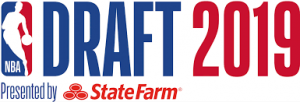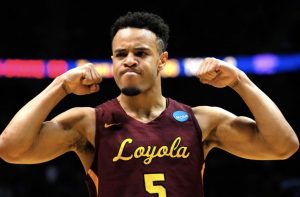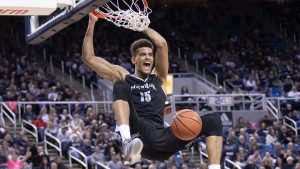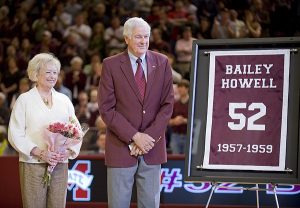With the 2019 NBA draft taking place later this month, we will spend the next few weeks taking a walk down memory lane with a choice collection of players who are celebrating an awesome anniversary this year. From a future Hall of Famer selected 2nd overall in 1959 (60th anniversary) through a conference POY picked in the 2nd round in 2009 (10th anniversary), these stars have all seen their dreams come true in past drafts. We continue our series with Nick Werkman, who played basketball at Seton Hall before being drafted by the Celtics in 1964. His grammar school team won 100 consecutive games, his high school team won the Parochial A state championship during each of his 4 years, and after joining the Pirates he ended up with 2273 PTS/1036 REB in only 3 seasons. HoopsHD’s Jon Teitel got to chat with Nick about being 1 of the greatest scorers in NCAA history and the 55th anniversary of getting drafted.
Your nickname was “Nick the Quick”: who gave you the nickname, and how did you like it? I loved it. I got it from our athletic department in my sophomore year. Oscar Robertson had a nickname, as did many others because it was just the fashion of the time. It rhymed…but I do not know if I was that fast!
In 1961 the school received a multi-year ban from playing in a national tourney due to its involvement in a point-shaving scandal: why did you decide to stay at Seton Hall knowing that you would never get to play in the postseason? In hindsight I made a mistake: I probably should have changed schools because I did not realize how damaging it would be to my career. We originally traveled all over the country but then our schedule changed a lot and we were only allowed to play on the East Coast. My freshman team was undefeated and the varsity team that year was very good as well so we expected to be a top-5 team. To be honest, nobody knew exactly what to do. I was recruited by schools like Kentucky/St. John’s/etc. 1 reason that I went to Seton Hall was because our biggest home games were at Madison Square Garden: the rest of the games were at our home gym. It was fantastic to play there and I got a pass to go to the Garden anytime I wanted to. Many people say I saved the program but I did not save myself because I never played in a postseason tourney.
In 1963 you led the nation with 29.5 PPG: did you feel like you were the best player in the country? I thought that I was the best in the country during each of my years there!
That same year you were also named an All-American: what did it mean to you to win such an outstanding honor? It was great because back then people stayed in college for 4 years so everyone wanted to be an All-American. My whole life I wanted to be on a Wheaties box so I never drank/smoked/did drugs…but I picked the same year that Mickey Mantle made it! It is nice to watch a guy like Jeremy Lin breathe some fresh air into the sport. I was the 1st in my family to go to college: I came from a blue-collar family. My 1st contract was for $8500 so I do not know how a player like Allen Iverson can lose (or even spend) $90 million!
In 1964 you won the Haggerty Award (which is given to the All-Metropolitan New York D-1 POY): how big a deal was the Haggerty Award back then? It was for the best player in the metro area so it was a tremendous honor. NYU was great, as were Manhattan/St. John’s, so there were a lot of All-Americans competing for it. NYC is the mecca of basketball and pro basketball was not as big back then. People would come to MSG to show their stuff.
Your career 32 PPG is #9 all-time in D-1 history: what was your secret for being a great scorer? My secret is a little different from what most people think. I was not a guy who could fit into a category like guard or forward: I was an all-around type of scorer. I would score a few baskets on the fast break, a few more around the basket, and then several more on foul shots. I was not always a pure shooter but I was tough to stop because I could post up or take my opponent outside. We were scoring in the 90s when most other teams scored in the 60s. We won 4 state titles in high school and I averaged about 20 PPG with several other teammates in double-figures. When you play for a balanced team like that you never expect to make the leap to 30 PPG. I was triple-teamed during every game.
In the summer of 1964 you were drafted 43rd overall by Boston but never played in an NBA game: did you see that as a validation of your college career, or the realization of a lifelong dream of getting drafted, or other? I never wanted to be drafted by the Celtics. They had just won 9 of 11 titles with Hall of Famer John Havlicek playing 20 minutes off the bench. You know how far down I was on the bench: you needed a spyglass just to find me! That dynasty was so set that it was hard to make the team so I was just battling for a roster spot. I figured that I would be drafted by a nearby team like the Knicks or 76ers so that all my friends could come see me play. The dream of my life would have been to get drafted by the Knicks: then maybe I could have become the 1st Jeremy Lin. Bob Cousy was coaching Boston College at the time and he was the 1 who recommended me after I scored 40+ PTS against his team.
What have you been up to since retiring from basketball? I got married to my college girlfriend and we had 3 children. My son Nick was all-state in baseball and got a tryout with the Yankees. I coached at Stockton State and was assistant AD for 10 years.
When people look back on your career, how do you want to be remembered the most? I am the Muhammad Ali of Seton Hall: the man who made it on his own.







